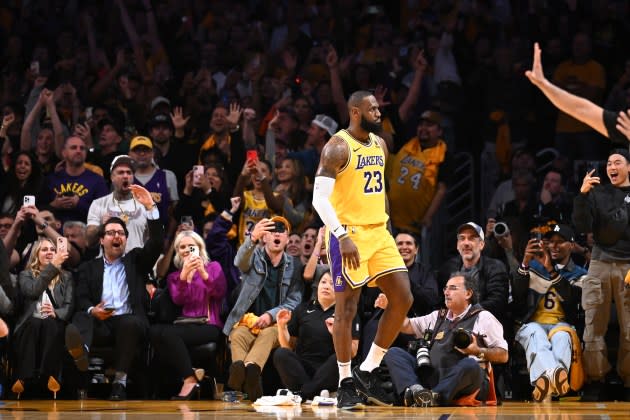Former ESPN Boss John Skipper Says Retaining NBA Rights Is An “Existential” Must For Disney
- Oops!Something went wrong.Please try again later.
- Oops!Something went wrong.Please try again later.

Former ESPN President John Skipper, who led the effort to secure the current NBA rights deal, says incumbents Disney and Warner Bros. Discovery have no choice but to re-up with the league.
“These are existential rights for ESPN,” he said during an episode of Pablo Torre Finds Out, a podcast produced by Meadowlark Media, which Skipper co-founded in 2021. “They have to have the NBA. And it’s pretty close to existential with TNT. I don’t know if they have to have the NBA, but I think they do.”
More from Deadline
Disney Unveils ESPN Financials As It Preps Standalone Sports Segment
Boston Celtics & Dallas Mavericks Victories Score ESPN Best NBA Opening Night In 11 Years
SAG-AFTRA & Studios Set More Contract Talks For Friday; "Cautious Optimism" Motto Of The Day
The companies’ 9-year pacts with Turner and ESPN, which average a total of $2.6 billion a year, are due to expire at the end of the 2024-25 season. As has happened in the NFL and other sports, large tech firms like Amazon and Apple are taking a close look at the rights given the overall shift toward streaming. NBCUniversal, whose Peacock streaming service carries a significant amount of live sports, has reportedly also expressed interest. A digital component could inject newfound billions into NBA coffers, at a moment when traditional media players are confronting financial challenges across their operations in an era of rampant cord-cutting.
Live sports viewership is the main thing keeping the traditional pay-TV bundle from completely unraveling. Already, several million customers are cutting the cord each year, depriving media companies of a large chunk of distribution revenue. ESPN, for example, has lost more than one-quarter of its household penetration over the past decade. While NBA games are a distant second to the NFL in terms of ratings, they do deliver cachet in other ways, with rights deals encompassing video clips that circulate on social media.
By the traditional Nielsen yardstick, however, viewership began the season this week down a notch from last year, though it has since moved ahead of the 2022-23. Some observers have speculated that any softness in ratings down the line could make Disney-ESPN and Warner Bros. Discovery, which owns TNT, less eager to shell out tens of billions on a new package. Skipper and David Samson, a former Major League Baseball club executive and Meadowlark podcast host, both pushed back on that notion, saying ratings are seldom a material issue in negotiations.
“I’m not sure that ratings ever factored that much into the calculation” of rights deals, Samson said.
“We didn’t get paid according to ratings, other than advertising,” Skipper agreed. Distribution fees, he added, “don’t change a cent based on ratings.”
Skipper, who presided over significant MLB, soccer and college football rights acquisitions when he ran ESPN as president for six of his 27 years at the network, said he never adhered too rigidly to a set of financial guidelines. “I never did a whole lot of calculating and figuring out of ‘What should we pay?'” he recalled. “I went into a negotiation believing I needed to win and I needed to get those rights to maintain ESPN’s status as the worldwide leader in sports.”
When Samson archly questioned whether all Disney brass took such an instinctual approach, Skipper clarified, “It’s not quite that casual. I had a CFO who spent time doing the budgets and doing the projections. … I’m simply talking about the idea that there is some intrinsic, inherent value that can be calculated. There’s not. … That was my attitude and that was my intention with those deals, was to win because we needed that content. Turner and ESPN need this content. This is a really, really hard problem.”
In more recent times, ESPN has elected to let marquee properties like Big Ten football leave the fold. The company has also undergone some of the most significant job cuts in its history as part of a sweeping set of Disney-orchestrated cutbacks.
Skipper and Samson, who once sat on other sides of the bargaining table, both noted that WBD chief David Zaslav months ago signaled his willingness to pass on the NBA if the price got too high. “We’re seeing the possibility of Turner saying, ‘Hey, we’re being priced out of this market’ – which happens,” Samson said.
The NBA process has been further complicated for ESPN by the sports outlet’s parent, Disney, saying publicly this year that it is seeking a minority partner to help with distribution and other expenses. Speculation has turned toward tech firms or pro leagues as potential stakeholders. Samson said it means Disney intends to sell off ESPN in order to attend to its other corporate priorities.
“I don’t believe that the board and [CEO Bob Iger] want to sell ESPN as a whole,” Skipper said. “They may be forced to because I’m not sure there is a minority partner.”
Skipper resigned from ESPN in December 2017 and went on to the executive chairman post at sports streamer DAZN prior to co-creating Meadowlark with former ESPN host Dan Le Batard. Torre is also a former ESPN staffer.
Best of Deadline
SAG-AFTRA Interim Agreements: Full List Of Movies And TV Series
2024 Presidential Election Debate Schedule: Dates, Times, Who'll Be There And Who Won't
2023 Premiere Dates For New & Returning Series On Broadcast, Cable & Streaming
Sign up for Deadline's Newsletter. For the latest news, follow us on Facebook, Twitter, and Instagram.
